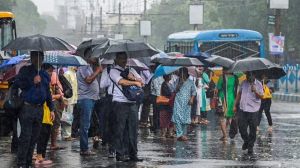Shubhajit Roy, Diplomatic Editor at The Indian Express, has been a journalist for more than 25 years now. Roy joined The Indian Express in October 2003 and has been reporting on foreign affairs for more than 17 years now. Based in Delhi, he has also led the National government and political bureau at The Indian Express in Delhi — a team of reporters who cover the national government and politics for the newspaper. He has got the Ramnath Goenka Journalism award for Excellence in Journalism ‘2016. He got this award for his coverage of the Holey Bakery attack in Dhaka and its aftermath. He also got the IIMCAA Award for the Journalist of the Year, 2022, (Jury’s special mention) for his coverage of the fall of Kabul in August 2021 — he was one of the few Indian journalists in Kabul and the only mainstream newspaper to have covered the Taliban’s capture of power in mid-August, 2021. ... Read More
Local corruption trumps ‘Vishwaguru’, ‘democracy in danger’ on Bengal poll street
"Pakistan ko tight kiya (Pakistan has been taught a lesson), that is something people here feel good about. Not much more," says Pawan Kumar Harijan, a lawyer practising in Purulia trial courts.
 File photo of voters at a polling booth under Tamluk constituency during the sixth phase of the Lok Sabha election. (Express photo by Partha Paul)
File photo of voters at a polling booth under Tamluk constituency during the sixth phase of the Lok Sabha election. (Express photo by Partha Paul)Aparajita Ghosh, an HR professional in a French multinational firm, who shuttles between Kolkata and Bangalore, is back in Serampore to cast her vote. Sipping cold coffee at Danish Tavern, the neat little cafe perhaps the only reminder of this Bengal area’s old colonial links to Denmark, she hasn’t warmed up to the BJP’s Vishwaguru campaign. Prime Minister Narendra Modi’s foreign trips are a drain on the exchequer and don’t add to much, she says.
Her scepticism may strike a discordant note in what is largely seen as a successful BJP campaign projecting the PM as having given India pride of place at the global high table. But the campaign has found few echoes on the ground.
It has reached a farmer in Singur, Rabindra Sadra, who says “the world is looking at India because of PM Modi”. And Dipesh Dhar, who lives in Salt Lake City and deals with stocks trading, who says “there is a sense among some of us that India has arrived… But beyond that, not much.” Says Pawan Kumar Harijan, a lawyer practising in Purulia trial courts: “Pakistan ko tight kiya (Pakistan has been taught a lesson), that is something people here feel good about. Not much more.”
Nitya Gopal Bhattacharya, a retired government official who lives in Asansol’s Kalyanpur Housing Colony, differs: “As far as I understand, the Western countries don’t have a very positive view of India.”
Barrackpore-based Shirshendu Mondol, who deals with supply of tractors in rural Bengal, laughs when asked why Modi’s foreign policy is not a talking point. What people are concerned about is corruption, lack of jobs and “the politics of doles for women”, he says.
Arnab Roy Chowdhury, who leads the technical team at a Kolkata-based company dealing in heavy machinery at power plants, says: “People in these parts of Medinipur, Bankura, Purulia are more concerned about bread-and-butter, local issues.”
If the BJP’s foreign policy hasn’t caught the public imagination in most parts of Bengal, the INDIA’s “democracy-in-danger” narrative also appears to have few takers. If it comes up, it is in terms of the action by Central agencies against Opposition leaders and parties.
Namita Ghosh, a former vice-principal of a school in Jharkhand, now based in Serampore, says: “Why are the Enforcement Directorate and CBI going only after Opposition politicians? The government is so opaque.”
At the same time, in the case of the Mamata Banerjee-led TMC government, few are willing to give it the benefit of doubt. Businessmen in Asansol to lawyers in Purulia, teachers in Medinipur to homemakers in Kalyani, express their anger and frustration over the TMC’s “Syndicate” of corruption, with several of its senior leaders fighting allegations.
Dhar, who lives in Salt Lake City, says: “West Bengal definitely needs a good Opposition. Many in Trinamool are plain opportunists, and they will shift if the momentum shifts and the TMC is at the risk of collapsing.”
There is more sympathy for Delhi Chief Minister and Aam Aadmi Party (AAP) supremo Arvind Kejriwal, who is supposed to go back to jail on June 2 over Delhi excise policy scam charges. Speaking for many, given Kejriwal’s past as an anti-corruption crusader, a sceptical Prasun Bhowmick, an official in the state Agriculture Department, asks: “Do you think he has taken bribes?”
In a swipe at the BJP’s “washing machine”, dubbed thus by the Opposition, Sankar Srivastav, a cab driver in Kolkata, says the AAP leader should have done what others did. “Kejriwal-ta boka. Or uchit chhilo Modi’r saathe haat miliye nitey (Kejriwal is dumb, he should have joined hands with Modi).”
As regards Modi, many TMC voters say they have not forgotten how he taunted Mamata during the 2021 Assembly elections, with calls of “Didi-o-Didi”. “The attack on a woman Chief Minister like this did not go down well with the people here, so Modi did a course correction,” believes Ambuj Gorain, a former Indian Air Force officer who currently works at the Punjab National Bank in Kolkata.
But Pawan Kumar, the lawyer in Purulia, wonders if the discourse has improved much. “Yahan democracy khatre mein hai is not the issue… Here, it is ‘Hindu khatre mein hai, Musalman khatre mein hai’ (Here, it is not about democracy being in danger. The talk is either ‘Hindu is in danger, or Muslim’).”
Photos


- 01
- 02
- 03
- 04
- 05






























